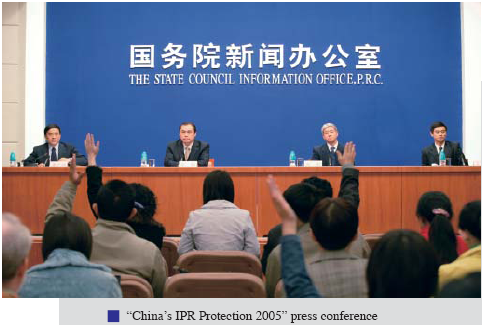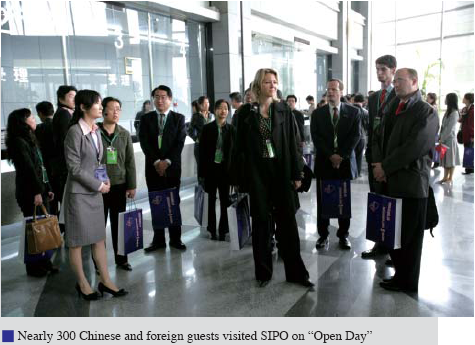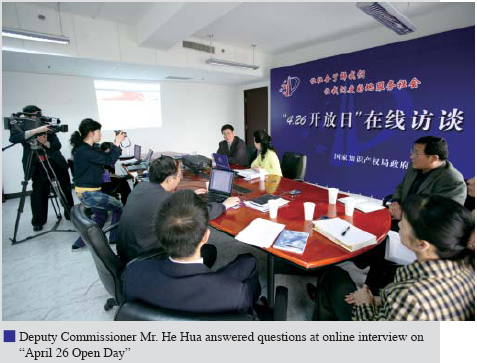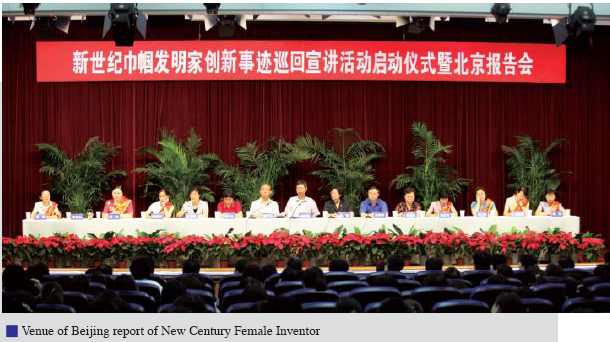Chapter IV Publicity, Training and Academic Activities
1. Training
In 2006, with the purpose of meeting the country's goals on economic and social development, IP offices nationwide provided in-depth and extensive training courses on various IP topics, inter alia, the formulating of a national IP strategy, the strengthening of the institutional construction of IP system, and the enhancement of independent innovation capacity.
1.1 Progresses Achieved in IP Training
In 2006, the Office organized 8 IP training courses on different themes and some 630 person times from government officials at all levels and professionals attended the training. The courses include the Second Training Course for Municipal Leaders on Independent Innovation and IP, as part of the Training Program of the Organization Department of the CPC Central Committee, with attendance of over 40 municipal leaders in charge of IP work; the Eighth Training Course for Director Generals of IP Offices Nationwide, attended by around 100 leaders from all provincial and municipal IP offices and some city level IP offices, with the purpose to improve their management capacity and professional skills; the Third Training Course for IP Trainers from Colleges and Universities, in cooperation with the Ministry of Education, to promote IP training in higher education institutions and enhance the team building of trainers; the Fifth Training Course for National IP Trainers, to enhance the national IP training; the National Advanced Training Course on Intellectual Property Laws and the National Advanced Training Course on Intellectual Property Management, in cooperation with the Tsinghua University, to meet the goals and tasks set forth in the Eleventh Five-Year Plan on IP Talent and strengthen the training for senior IP professionals; the Training Course for High-tech Talents on IP, in cooperation with the China Postdoctoral Science Foundation, to further expand training channels for senior talents and innovate training methods; and the Advanced Training Course for Industries on IP, with the private enterprises as the target group, to strengthen IP work in enterprises.
Based on different local situation, the local IP offices hosted more than 60 training courses entrusted by the Office, targeting at government officials, IP managers of various industries, and intermediate service providers on IP. Around 10,000 participants attended these courses, with an increase of 20% over 2005. At the same time, local IP offices also organized 1,925 courses for 320,524 participants, which played a significant role in improving the capacities to use IP system and fostering a culture environment encouraging independent innovation and obtaining of independent IPRs.
1.2 Internal Education and Training Have Become
More Scientific, Systematic and Standardized Facing with new developments and challenges in the field of IP, the Office intensified training for its cadres. 16 officials at the Director General level attended the full-time training offered by the Central Party School and the National School of Administration. 2 training courses were organized by the SIPO Party School for 60 officials at Division Director level. In cooperation with the National School of Administration, the Office organized one Career Training for officials at the Director General level and one for officials at the Division Director level for over 70 participants. Moreover, in cooperation with the School of Government of Beijing University, the Office organized one MPA Advanced Course for Government Officials, which was attended by 40 officials at Director General or Division Director level.
As the Civil Servant Law of the People's Republic of China was implemented in 2006, the Office offered trainings on the law to all its staffs, in order to enhance the ability of administration and action by law.
Training Guidelines for Patent Professionals (trial) and a Implementation Act of Senior Talents Cultivation 2006 -2010 (trial) were formulated in 2006. The integration of training resources, improvement of training quality and trainer team building were strengthened in patent examiners' training. The intensive trainings provided by China IP Training Center to new examiners were further improved. One new-recruit training and one examination business training were offered to 564 new examiners. Meanwhile, professional trainings on different themes were organized, e.g. PCT International Search and International Preliminary Examination, Computer Searching, Public Administration and Financial Management.
In order to strengthen professional cultivation and improve quality and capability of talents in various aspects, the Office further intensified the language training for its elites and professionals. 20 employees attended full-time English courses offered by the Beijing Language and Culture University. Over 700 staffs joined 31 after-hours language courses to improve their foreign languages capability, such as English, Japanese, German, French and Korean. The Office continued its overseas talent training, dispatching 24 staffs to study law, economics and administration in the United States, the United Kingdom, Italy, Japan and South Korea. The Intellectual Resources Introduction Office of SIPO organized study visits on technological innovation and IP protection to France and Macao. Some 50 staffs obtained their master degree (diploma) by attending various on-the-job courses. In addition, nearly 160 staffs attended Post-Graduate Courses on Civil and Commercial Law, jointly held by the Office and the China University of Political Science and Law.
1.3 Enhanced Role of China Intellectual Property Training Center (CIPTC) in Training
In 2006, CIPTC completed various training tasks entrusted by the Office. It held 50 training courses of different themes with nearly 11,500 participants. 45 of these courses were routine ones with 5,200 trainees (including 6 international courses for 220 participants); 4 were distance learning and 1 were classroom type with 6,248 trainees (including 2 sessions of DL101 offered by the WIPO Worldwide Academy for 1,007 participants).
Great progresses achieved in routine training. Pre-examination training for patent agents was held; training for government leaders at city and county level was continued; Advanced Workshop on IP Judicial Protection was jointly held with the Beijing First Intermediate People's Court; 2 officials were dispatched as speakers to Mexico and South Korea to increase international and interregional cooperation on training; 8 trainers were invited from countries including the United States and Singapore; and cooperation with the Korean International Intellectual Property Training Institute was further explored.
Significant achievements fulfilled in IP distant learning. 5 distant learning courses have been initiated on Intellectual Property Legal Basis, Patent Documentation Information and Search, Copyright, Unfair Competition and Patent Agent Practice. IP Legal Basis was set for the first time as a compulsory course in the Beijing University of Aeronautics and Astronautics, with on-line attendance of 271 school students. Intellectual Property Rights and Intellectual Property System, the first video course, was opened in October, with the attendance of 518 students. 1,000 CDs on IP Study for Government Officials were distributed for free to officials at city level.
The Office joined the 653 Knowledge Updating Project for Scientists and Technicians launched by Ministry of Personnel, and would disseminate IP knowledge through distant learning for over 3 million scientists and technicians in five different technological fields.
2. Publicity
In 2006, to better serve the goal of building an innovative country, the Office carried out extensive publicity activities on IP, creating a sound and positive social environment for IP. An IP Publicity Platform consisting of SIPO official portal, China Intellectual Property News, Wealth of Knowledge (TV program) and China Inventions and Patents Magazine, has been established and will play an important role in guiding public opinion and disseminating IP service information.
The Office, with focus on its major tasks, organized a series of events for providing accurate guidance to public opinions and promoting the development of IP work. In the early 2006, Tian Lipu, Commissioner of SIPO, took an on-line interview by the www. gov.cn, answering questions about the operation and function of SIPO. The Office continued to convene CCTV Innovation Gala, together with CCTV. A Chinese Patent Information Dissemination Platform was established together with CCTV and other medias in 2006, providing patent transfer information and advice on how to protect IPRs to inventors free of charge. The Platform would establish long-term connection with National Patent Technology Exhibition Center set up in 18 cities to form a permanent exhibition trade center.
Cooperation with related authorities was strengthened to facilitate IP publicity. SIPO, the State Council Information Office, National Trademark Office and National Copyright Administration jointly held the press conference on China's IPRs Protection 2005.
IP publicity was carried out in popular and easy understanding forms to promote the fostering of an IP culture. April 26, 2006, the World IP Day was the Open Day of the Office, attracting nearly 300 visitors, including diplomats of over 20 embassies in China, representatives from international organizations and domestic visitors. On June 27th when the total volume of patent application in China exceeded 3,000,000, the Office held a press conference, which was reported by various central-level presses. In cooperation with the Beijing Intellectual Property Office, it launched a Competition on Intellectual Property Rights for Undergraduates of Beijing. The Office participated in the National Youth Innovation Competition held by the China Education Association and organized Female Inventors Roving Team to make 4 reports in Beijing, Wuxi, Yichang and Dalian. A series of on-line interviews name "Focus on Enterprises' Future" was initiated in several websites, in particular the official portal of SIPO. This was well welcomed by the government officials, enterprises and the public. In order to promote the fostering of an IP culture, IP themed songs collection and selection was carried out around the country to publicize intellectual property culture.
After the official website of SIPO was upgraded to a national portal on Intellectual Property (referred to IP government portal), the yearly hits of the site reached 2.18 billion, 130.28% increase over 940 million in 2005. The daily hits of the website were 8 million. The daily patent search hits were 810,000 while over 4 million pages of patent descriptions were downloaded. The intellectual property portal had more than 300 columns.




3. Academic Activities
In 2006, the Office actively conducted IP academic activities, enhancing China's IP research climate.
The Secretariat Office of the Leading Group on the National Intellectual Property Strategy Formulation carried out academic exchanges not only with experts and scholars in all related fields from the mainland and Taiwan, but also with government officials, experts and scholars and entrepreneurs from the United States, the United Kingdom, Japan, Norway, Australia, the Czech Republic, Thailand, South Korea, Malaysia, Bangladesh, Mongolia, the World Trade Organization (WTO) and the European Commission (EC). Significant achievements were gained in the drafting of the National IP Strategy. As a result of a Call for Contributions for the Suggestion on the Drafting of the National IP Strategy, 133 articles were received, of which 131 were from domestic contributors and 2 from the United States. Two first awards, five second awards, nine third awards and nine consultation awards were granted.
For the third amendment of the Chinese Patent Law, the Office organized social consultations and distributed a Research Report on Third Amendment of the Patent Law and its Implementation Regulation giving a comprehensive exploration on the legal and technical aspects of the disclosure of origin of genetic resources used in patent applications.
After verification and acceptance of 49 academic research subjects of the previous year, the Office concluded 49 research reports with a total of two million words. The theme selection and mid-term communications for 33 topic researches of the 2006 Academic Committee were made. Some results have played an active role in the actual work. Several technical explanatory meetings and examination standard seminars have been held in succession.
In cooperation with the China Intellectual Property Society and its patent committee, the Office invited experts evaluating the contributions received in the 2006 National Intellectual Property Article Solicitation, which greatly promoted the study on IP laws and regulations, and the guidance of practice on the protection of IPRs.
China Intellectual Property Society, Law Division of American Chemical Society and other departments jointly held a "Beijing Summit Forum on Intellectual Property Right in the Field of International Pharmaceutical & Chemical". It also cooperated with German Vossius & Partner to organize an "IP Law and Practice in Europe and Germany, Strategic Viewpoints" in Shanghai and Hangzhou. In addition, the Society received visit of the Far East Delegation of American Intellectual Property Laws Association (AIPLA) and the Taiwan Chinese Intellectual Property Protection Association. All these activities promoted the academic exchanges on IPRs.
2013-07-17 Print
Print